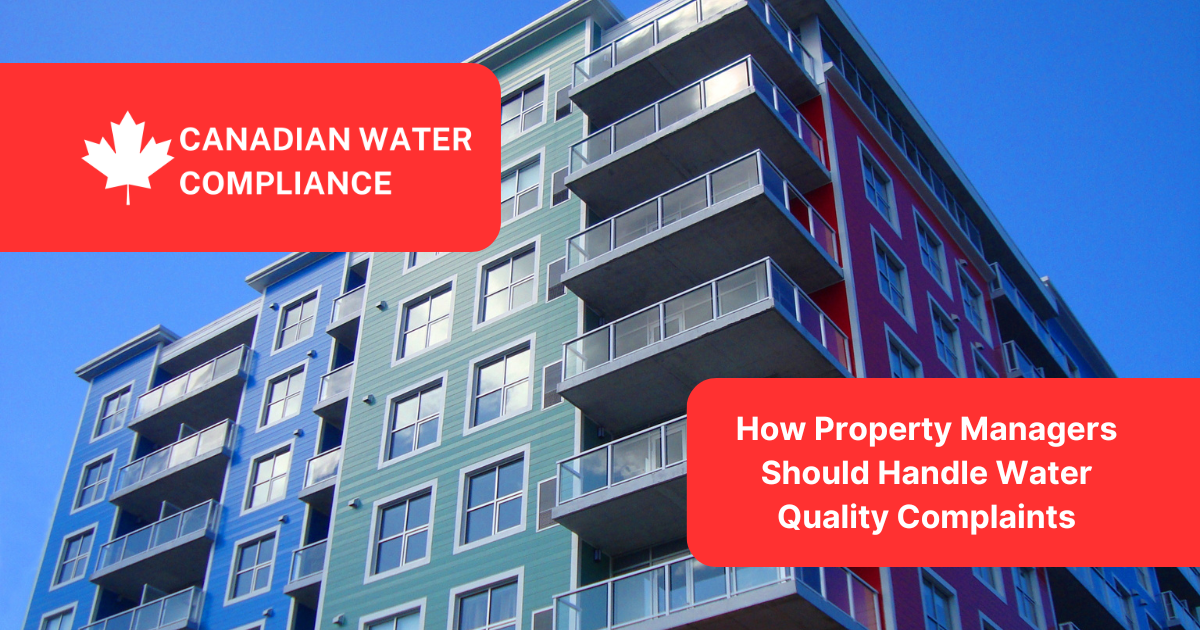
Written By: Canadian Water Compliance | On
Water quality issues in residential and commercial buildings aren't just inconvenient—they can also lead to serious liability concerns and erode tenant trust. For property managers and building owners in Ontario, effectively handling tenant complaints about water quality is not only a matter of professionalism but also of compliance with public health and safety regulations. Whether it’s odd tastes, discoloration, or concerns about contaminants, being prepared with a strategy and knowledge of best practices is essential.
Tenants may raise concerns for a wide range of reasons—some rooted in actual water contamination, others based on perception or lack of information. Common complaints include:
Discoloured water (yellow, brown, or cloudy)
Unusual tastes or odours
Low water pressure or intermittent supply
Visible particles or sediment
Suspected illness or irritation from water use
While not all of these point to a health hazard, each deserves a timely and well-informed response.
Under Ontario's Building Code and various health and safety regulations, landlords and property managers are obligated to provide potable water that is safe for consumption and free from contaminants. This includes ensuring that water supplied through private systems (such as wells) meets local standards or that municipally supplied water is not compromised by plumbing issues or system deficiencies within the building.
If a tenant files a formal complaint with the local public health unit or the Landlord and Tenant Board (LTB), you may be required to provide documented proof of water safety. Failure to do so can result in orders for corrective action, fines, or even legal liability in the case of tenant illness.
Here’s a step-by-step guide to managing water quality complaints effectively:
Acknowledge tenant complaints right away, even if you haven’t determined the source of the issue. Keep records of all communications, including dates, actions taken, and any follow-up testing or inspections.
Don’t rely on assumptions. Partnering with an accredited water testing provider like Canadian Water Compliance ensures fast, accurate testing for key parameters such as:
Lead and copper
Legionella and other pathogens
Coliforms and E. coli
Chlorine levels
pH and hardness
We offer certified technician sampling and laboratory analysis, which not only delivers credibility but can also help you satisfy legal documentation requirements.
Once testing is complete, share results with your tenants in plain, understandable language. If the issue is not health-related (e.g., safe but discoloured water due to pipe sediment), explain the cause and any corrective measures being taken.
Regular water testing can identify issues before complaints arise. Create a water quality management plan that includes:
Annual or biannual potable water testing
Legionella testing for HVAC and water systems
Flushing and disinfection routines
Filter or softener maintenance
This proactive approach demonstrates diligence and may help protect you from liability.
If testing reveals a hazard, or if tenants report illness, report the issue to your local health unit. Early collaboration may help reduce enforcement actions and protect your residents' health.
At Canadian Water Compliance, we specialize in supporting Ontario property managers with:
Certified on-site water sampling
Full laboratory analysis
Clear, professional reports for tenants, owners, and regulators
Consultation and action plans for addressing water quality issues
We help you move from reactive to proactive water management—ensuring compliance, protecting your residents, and maintaining your reputation.